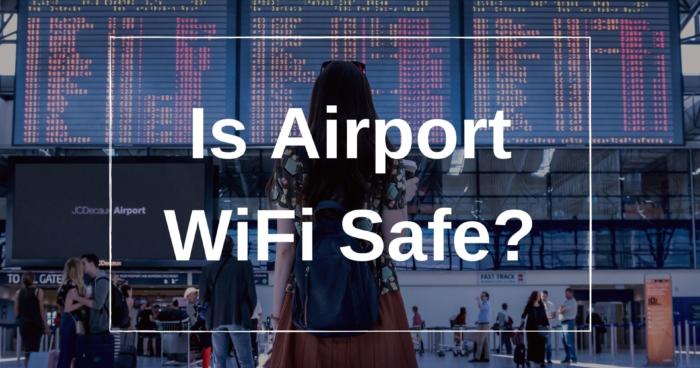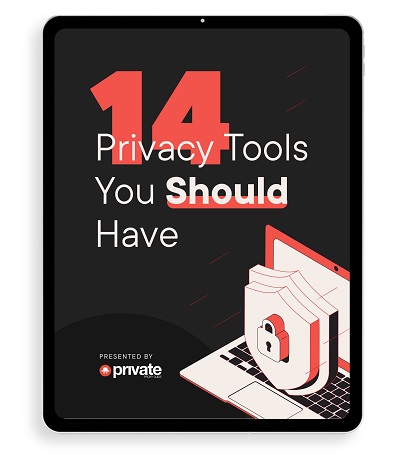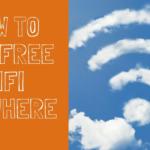The Internet is not a thing of novelty anymore. It has become a fundamental requirement in the digitally driven world. Starting with Finland, several countries and the European Union made the Internet a fundamental alright for its citizens. You will find it at your nearest Starbucks, McDonald’s, subway station, and even airports that have started offering Wi-Fi as a standard.
It is often powered by an Internet provider who gives a small free data quota before asking to shell up money to use further. Accessing public Wi-Fi comes with an added risk that we tend to ignore at times. Especially when you are shuttling flights at an airport and need the Wi-Fi for quickly checking your emails, the threats and risks are the least of our worries. Let’s have a closer look at the things we are risking and the looming threats to our data.
1. What Makes Airport Wi-Fi Unsafe?
1.1 Eavesdropping
This generally happens when accessing unsecured or public Wi-Fi. An unsuspecting user can connect to a malicious Wi-Fi hotspot network that imitates the official network of the Airport. For instance, they can name it as San_Diego Airport WiFi instead of the official San Diego Airport WiFi. Make sure to check for spellings, special characters, and numbers added to the name.
Once connected to the Internet, the hacker can force the user’s device to visit the unsecured version of different websites and applications. This will help them perform DNS hijacking for gathering login credentials, crucial information as they are entered on different websites and applications.
1.2 Malware Distribution
Malware comes in a variety of forms – Adware, Trojan Horses, Worms, and Viruses, amongst others. Believe it or not, they can be planted on your device through the Wi-Fi network as well. To begin with, they can place ads on every site you visit. In the worst-case scenario, the ads can be permanently stored and shown across different apps and sites even when not connected to the nefarious network.
Apart from that, viruses and trojan horses on your computer can do long-lasting damage to your data and privacy. Make sure to have a good antivirus program in place.
1.3 Session Hijacking
When a hijacker is successful in intercepting your activity, information and the established connection to websites are available to him. All of the gathered information can be used to create a matching computer configuration and hijack your connection.
For instance, you are on a bank website and logged in to perform some transactions. Suddenly, the hacker can access your net banking session while you are locked out. He has control of what’s happening in your online account, and you can imagine the financial loss that can be caused by this—not even taking into account the changes you will need to make to rebuild the trust around your Internet dashboard.
1.4 Gathering Data
Many tech companies set up free public Wi-Fi networks in places like airports, train stations, and common hangout places. They offer it with a sizable amount of monthly data to get by. They allow you to use a specific basket of applications that are sponsoring the whole program. It helps them garner more information about the users for helping them serve better ads and thus providing better targeted conversion without needing high-end market research. Few services, apps, and websites load faster than others in an attempt to swerve the user into a specific direction of data gathering. In a nutshell, companies provide free Internet to create an ecosystem to know more about your activities and preferences for accurate advertisement targeting.
2. How to Make Airport Wi-Fi Safer
2.1 Always Visit HTTPS version of Websites
The standard HTTP connection to a website earlier was not encrypted and hence vulnerable to the snoopers, hackers that could read your activity, data, and other ramifications were involved. Google made things better with the ultimatum for websites to use HTTPS by July 2018. The easier way to know if a website is using HTTPS is when a small padlock is next to the link in the URL bar of the browser. When the data transmission between you and the website is encrypted, anyone attempting to snoop in only sees jumbled bits of data in random forms that cannot be comprehended. Keep an eye out for sites using non-HTTPS version sites, and tread lightly when sharing anything on these websites as they are vulnerable to exposure.
2.2 Use 2-FA
Sometimes it is impossible not to use the Wi-Fi at the airport as you need to check important reports, emails and even do urgent transactions that can’t wait. Doing them over a secured or suspicious network is acutely risky, to begin with. Set up 2-FA(Two-factor authentication) on places where you need to log in online. It is a secondary authentication method that is on top of the regular login credentials. Trusted and free authenticators such as google authenticator and Microsoft Authenticator can do the job pretty well. Once it is set up, it will send a 6-digit code on your mobile authenticator app or get an SMS for the same.
So even when a hacker gains your login credentials (ID and password), it will be rendered useless because a second authentication will be required for accessing your accounts.
2.3 Use Your Own Mobile Hotspot
Virtually everyone owning a smartphone has some sort of mobile data on their cellular plan. When you are a frequent traveler, it is imperative to have data loaded on your SIM. Create a mobile hotspot and use it on your laptop for accessing the Internet instead of relying on the Public network. You avoid several risks involved in using airport Wi-Fi and being secure from any threat to your data, identity, and devices.
2.4 Use Virtual Keyboard
Virtual keyboards come in handy while entering confidential information (credentials, payment information, etc. ) online and spyware on your device, the network can intercept your keyboard strokes, sending the information to the hacker. Avoid that by using a virtual keyboard and prevent anyone from snooping on your keystrokes. You can use your own virtual keyboard app or use the one provided on different websites, apps.
2.5 Use a VPN Service
Take advantage of a virtual private network server for going online. It encrypts everything you send and receive on the Internet through Wi-Fi or wired. The VPN service provider also provides private DNS, dedicated IP, and more to prevent anybody from interception and eavesdropping to read your activity online. You can get started with a free trial before subscribing to a premium VPN plan. On top of that, you can also watch the OTT content from around the world by accessing different libraries of Netflix, Hulu, Prime, and more.
They also offer a 7 to 45 days money-back guarantee for users who want to get out if things don’t work out.
| NordVPN | ExpressVPN | Windscribe FREE VPN |
|---|---|---|
 www.nordvpn.com NordVPN Price: Servers: 6000+ in 111 countries Simultaneous connections: 6 Jurisdiction: Panama Payment: PayPal, AmazonPay, Crypto, Google Pay, Klarna Torrenting: OK Unblocks US Netflix: Yes Encryption: IKEv2/IPSec, AES-256, OpenVPN, NordLynx Dedicated IP: $3.69/month TrustPilot Score: 4,2/5 Money-back: 30 days Extra: Double VPN, Obfuscated servers NordVPN review |
www.expressvpn.com ExpressVPN Price: Servers: 3300+ in 105 countries Simultaneous connections: 8 Jurisdiction: British Virgin Islands Payment: PayPal, Crypto, AliPay, Klarna, Torrenting: OK Unblocks US Netflix: Yes Dedicated IP: Not provided TrustPilot Score: 4,4/5 Money-back: 30 days ExpressVPN review |
 www.windscribe.com Windscribe Price: FREE Servers: 11 countries Simultaneous connections: Unlimited Jurisdiction: Canada Torrenting: OK Unblocks Streaming: Yes Traffic: 10 GB Free TrustPilot Score: 4,8/5 Speed: Fast |
2.6 Disable Auto-Connect
When you connect to a new Wi-Fi network, the device asks to remember it for auto-connection so that the network is connected when in range. Untick that option that says to remember the network. Now the public Wi-Fi would not connect to your device without your consent. Make sure to save only trusted networks on your devices. A trusted network generally consists of the one at your home, friend’s place, and office space.
We earn commissions using affiliate links.


![Is Mobdro Legal and Safe to Use in in [month] [year]? Is Mobdro Legal and Safe to Use](https://www.privateproxyguide.com/wp-content/uploads/2020/10/Is-Mobdro-Legal-and-Safe-to-Use-150x150.jpg)
![Is uTorrent Safe to Use in [month] [year]? Is uTorrent safe to use](https://www.privateproxyguide.com/wp-content/uploads/2022/02/Is-uTorrent-safe-to-use-150x150.jpg)
![Best VPN for School WiFi in [month] [year] Best VPN for School WiFi in 2021 - How to Bypass VPN Bans](https://www.privateproxyguide.com/wp-content/uploads/2018/08/Best-VPN-for-School-College-150x150.jpg)
![Best Mesh WiFi Systems in [month] [year] Best Mesh WiFi Systems](https://www.privateproxyguide.com/wp-content/uploads/2022/07/Best-Mesh-WiFi-Systems-150x150.jpg)
![Best WiFi Analyzers for Android, iPhone & PC in [year] Best Wifi Analyzers](https://www.privateproxyguide.com/wp-content/uploads/2022/09/Best-Wifi-Analyzers-150x150.jpg)


![Android Tethering With USB, WiFi & Bluetooth [Step-by-Step Guide] Android Tethering - Step by Step Guide 2020](https://www.privateproxyguide.com/wp-content/uploads/2020/09/Android-Tethering-Step-by-Step-Guide-150x150.jpg)


![MyPrivateProxy Review in [month] [year] MyPrivateProxy Review](https://www.privateproxyguide.com/wp-content/uploads/2020/09/my-private-proxy-150x150.jpg)
![SSLPrivateProxy Review in [month] ([year]) SSLPrivateProxy Review](https://www.privateproxyguide.com/wp-content/uploads/2020/09/sslprivateproxy-150x150.jpg)
![High Proxies Review in [month] [year] High Proxies Review](https://www.privateproxyguide.com/wp-content/uploads/2017/06/highproxies-150x150.jpg)
![Blazing Proxies Review in [month] [year] Blazing Proxies Review](https://www.privateproxyguide.com/wp-content/uploads/2017/07/blazing-proxies-150x150.jpg)
![VyprVPN Review in [month] [year] vyprvpn](https://www.privateproxyguide.com/wp-content/uploads/2021/03/vyprvpn-150x150.jpg)